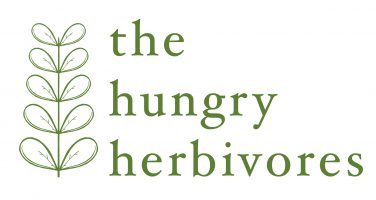Vegan Baking Essentials
The idea of baking without eggs, milk and butter perplexes many. My first ever job was in a traditional bakery, where i would be surrounded by trays of eggs. There wasn’t a chance of a vegan cake there! My boss was extremely confused when I first went vegan and started speaking of eggless cakes and whipping aquafaba; everything she was taught and had practiced for the last few centuries of her life were challenged. Unfortunately, she wasn’t interested in delving into the art of vegan cake… Regardless, I continued my trials of plantbased baking at home, making me and the family fat!
Baking is an exact science that I still don’t understand. Even after years as a baker and a cake business owner. Nonetheless, the cakes I create always seem to go swimmingly. I think that is due to the key vegan baking essentials. These items will always be in my little pantry, ready for when I make cakes, but also are so frequently used in day-to-day vegan cooking! If you haven’t plucked up the courage to put the eggless sponge in the oven yet or you’ve had one too many baking failures, here’s a great place to start! Check out The Hungry Herbivores vegan baking essentials to get you going!
[twocol_one]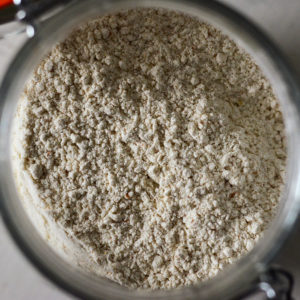 [/twocol_one][twocol_one_last]Flour – First and foremost, flour. This will be the main bulk of your baking mixture. It will create a beautiful bread and rolls, fluffy sponge or even the best homemade pizza dough ever. Because of it versatility, wheat flour is very hard to replace. I generally work with gluten-free flours, which will be an entirely different blog post of it’s own!! – but to keep things simple, lets start with the big boss. Try and use whole wheat flours or spelt flours where possible, as they retain much more nutritional value! [/twocol_one_last]
[/twocol_one][twocol_one_last]Flour – First and foremost, flour. This will be the main bulk of your baking mixture. It will create a beautiful bread and rolls, fluffy sponge or even the best homemade pizza dough ever. Because of it versatility, wheat flour is very hard to replace. I generally work with gluten-free flours, which will be an entirely different blog post of it’s own!! – but to keep things simple, lets start with the big boss. Try and use whole wheat flours or spelt flours where possible, as they retain much more nutritional value! [/twocol_one_last]
[twocol_one]Sugar – Ever made a yummy cake without sugar? Me neither. Sugar is essential in sweet baking. But that doesn’t mean it has to be bad for you! Making your cakes at home ensures that you can control how much sugar goes into your sweet treats and more importantly, what type of sugar. You could even use stevia for “sugar-free” cakes. However, I almost always use Coconut Sugar. Coconut Sugar is an unrefined sugar with low GI – therefore it is slow releasing! Aka – better than white, refined sugar. [/twocol_one][twocol_one_last]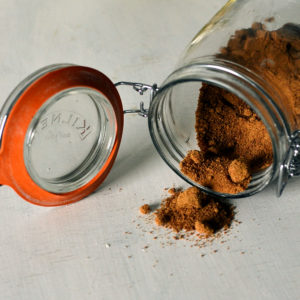 [/twocol_one_last]
[/twocol_one_last]
[twocol_one]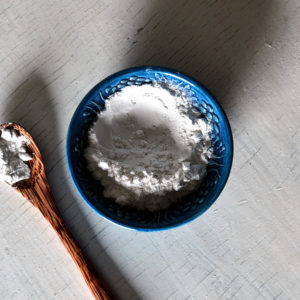 [/twocol_one][twocol_one_last]Baking Powder – Your raising agent is sooo important when you are removing eggs from the equation. Baking powder generates the chemical reaction your cake needs to expand and rise. Be careful though! If you are using self-raising flour, omit the baking powder, as SR flour already contains it! Too much can create a terrible taste, so only use in moderation![/twocol_one_last]
[/twocol_one][twocol_one_last]Baking Powder – Your raising agent is sooo important when you are removing eggs from the equation. Baking powder generates the chemical reaction your cake needs to expand and rise. Be careful though! If you are using self-raising flour, omit the baking powder, as SR flour already contains it! Too much can create a terrible taste, so only use in moderation![/twocol_one_last]
[twocol_one]Baking Soda/Bicarbonate of Soda – Same same but different. I’m not sure why you American guys call it baking soda, but whatever. This stuff is really essential for vegan baking too! Much the same as baking powder, it induces a chemical reaction that your cake needs. Bicarbonate of soda is used hand in hand with acids, like lemon juice and apple cider vinegar, which I have found essential in every vegan cake! [/twocol_one][twocol_one_last]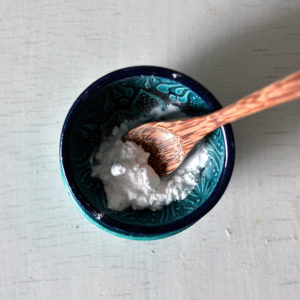 [/twocol_one_last]
[/twocol_one_last]
[twocol_one]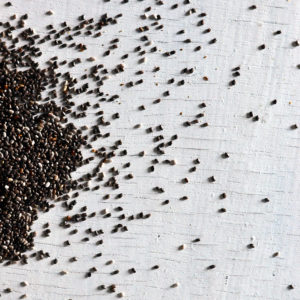 [/twocol_one][twocol_one_last]Chia Seeds – This might be an odd one, but I wanted to include it! I really love chia seeds, as they are a very interesting ingredient that are also extremely good for you. In terms of baking, chia seeds are great for creating a gelatinous texture (much like egg), therefore acting as a binder. You can make chia “eggs” with 1 tbsp. chia seeds and 3 tbsp. of water. You can also grind the chia seeds to make them undetectable in your baking. They make great cookies![/twocol_one_last]
[/twocol_one][twocol_one_last]Chia Seeds – This might be an odd one, but I wanted to include it! I really love chia seeds, as they are a very interesting ingredient that are also extremely good for you. In terms of baking, chia seeds are great for creating a gelatinous texture (much like egg), therefore acting as a binder. You can make chia “eggs” with 1 tbsp. chia seeds and 3 tbsp. of water. You can also grind the chia seeds to make them undetectable in your baking. They make great cookies![/twocol_one_last]
[twocol_one]Ground Flaxseed – Much like the chia seeds, ground flaxseed has a unique quality. 1 tbsp of ground flaxseed and 3 tbsp acts as one egg, as it also creates a gelatinous, binding texture. You will see flax “eggs” frequently in my baking recipes! Flax is an affordable ingredient, even more so if you buy it whole and grind it up yourself in a blender. Easy! [/twocol_one][twocol_one_last]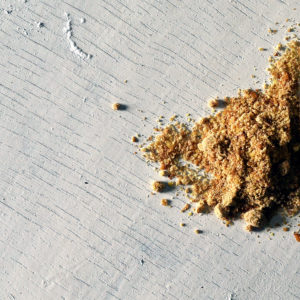 [/twocol_one_last]
[/twocol_one_last]
[twocol_one]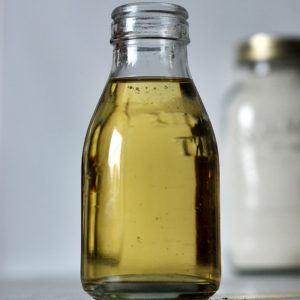 [/twocol_one][twocol_one_last]Apple Cider Vinegar – As I mentioned with the Baking Soda, acids are essential to make science happen in the baking! Generally I stick to apple cider vinegar, as it gives me great results. I make sure not to use much more than 1 tbsp as it will effect the taste. Alternatively, you can use lemon juice. Both acids can be added to nut milk to create the vegan equivalent to buttermilk[/twocol_one_last]
[/twocol_one][twocol_one_last]Apple Cider Vinegar – As I mentioned with the Baking Soda, acids are essential to make science happen in the baking! Generally I stick to apple cider vinegar, as it gives me great results. I make sure not to use much more than 1 tbsp as it will effect the taste. Alternatively, you can use lemon juice. Both acids can be added to nut milk to create the vegan equivalent to buttermilk[/twocol_one_last]
[twocol_one]Non-dairy Milk – Much more nutritious and less saturated fats than regular milk. Non-dairy milk is often used in the “wet” liquids to create the right texture and for giving the cake moisture. More often than not, I use non-dairy milk to create buttermilk, as it creates a lighter bake! Almond and Soy are my go-to’s for vegan baking, but any will do![/twocol_one][twocol_one_last]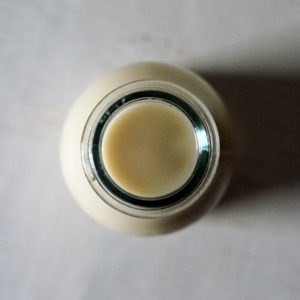 [/twocol_one_last]
[/twocol_one_last]
[twocol_one]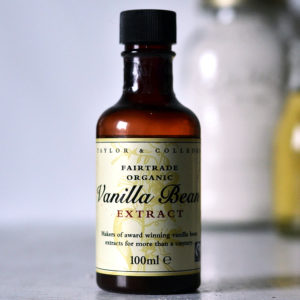 [/twocol_one][twocol_one_last]Vanilla Extract – Vanilla bean extract is super important in baking. Don’t under estimate how much a little can do to the overall flavour. Vanilla has a beautiful taste that is generally associated with cake. The quality really does make a difference to the flavour, so make sure you get the high concentrate extract, alternative use the bean! Other extracts, like almond extract is great for baking! [/twocol_one_last]
[/twocol_one][twocol_one_last]Vanilla Extract – Vanilla bean extract is super important in baking. Don’t under estimate how much a little can do to the overall flavour. Vanilla has a beautiful taste that is generally associated with cake. The quality really does make a difference to the flavour, so make sure you get the high concentrate extract, alternative use the bean! Other extracts, like almond extract is great for baking! [/twocol_one_last]
[twocol_one]Himalayan Salt – Salt?! Yes, Salt! It brings out the flavours in food, including sweet treats. I always add a pinch or two of Himalayan salt to my baking, not just to my salted caramel either. Like the vanilla, it is best to use a pure, good quality salt to create good quality bakes![/twocol_one][twocol_one_last]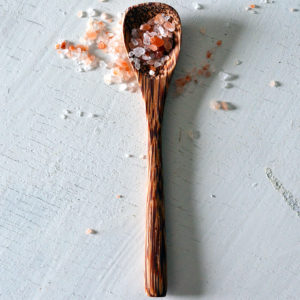 [/twocol_one_last]
[/twocol_one_last]
[twocol_one]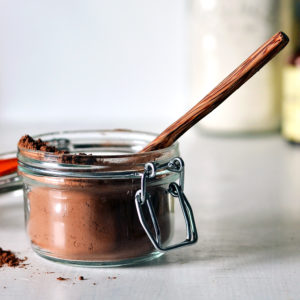 [/twocol_one][twocol_one_last]Cacao/Cocoa – Of course this isn’t essential in EVERY baking recipe, but these pantry staples wouldn’t be complete without the chocolate!! The worlds favourite flavour is created by cocoa powder, while it also creates a beautiful moistness. Make sure you are using a good quality unsweetened cocoa, or use cacao if you fancy![/twocol_one_last]
[/twocol_one][twocol_one_last]Cacao/Cocoa – Of course this isn’t essential in EVERY baking recipe, but these pantry staples wouldn’t be complete without the chocolate!! The worlds favourite flavour is created by cocoa powder, while it also creates a beautiful moistness. Make sure you are using a good quality unsweetened cocoa, or use cacao if you fancy![/twocol_one_last]
Can you think of anything I have forgotten? I can. Fats! Fats are often used in vegan baking, however there are so many options, I couldn’t fit it into one category. The most obvious being vegetable oils and vegan margarines, which are obviously not the healthiest addition to your baking, yet are effective in achieving a moist crumb on your cake. However, in certain recipe, fruit and veg can do the same job, for example, mashed bananas in banana bread or beet puree in chocolate and beetroot cake!
For the most part, I recommend using rapeseed/canola oil in your baking! Simple and cheap!
Get your pantry stocked up now!
